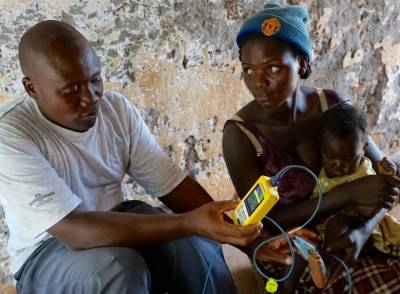Development of a robust and reliable pulse oximeter for use by frontline healthcare providers caring for children with pneumonia in low-income countries

Project Summary
Despite the progress in outcomes for children with pneumonia through appropriate treatment and case management guidelines, pneumonia still kills more children than any other infection. Low blood oxygen (hypoxemia) is associated with increased mortality and is one of the criteria used by the WHO to differentiate severe pneumonia where the child needs referral for oxygen therapy, from pneumonia that can be managed in the community with oral antibiotics. Hypoxemia cannot be identified reliably by clinical observation, but can be detected non-invasively with a pulse oximeter. Routine screening for hypoxemia provides an opportunity to further improve case management, referrals and treatment, and has been shown to improve outcomes in children with pneumonia in developing countries.
The Lifebox oximeter has been used in Malawi since 2012 at all levels of the healthcare service, for both diagnostic support and continuous monitoring. However, there are some key areas for improvement that are required to make it suitable for use in routine paediatric pneumonia care. Key to this is a reusable oximeter probe that fits children aged 0 days to 5 years old, is quick to give reliable readings and has an improved battery with resilience to power fluctuations. A re-designed device, optimized for use in routine care at all levels of the healthcare system in developing countries, is an important step to improving pneumonia diagnostics and care.
The aim of this project is to use a human centred design approach, working closely with end users from developing country settings, to redesign a re-usable paediatric probe. The probe needs to be suitable for children aged 0-59 months, use at the three health system levels (community, clinic and hospital ward), and healthcare workers with different levels of training.
 Close
Close

